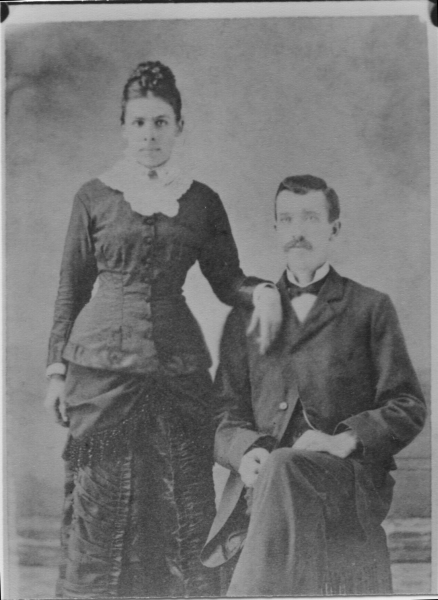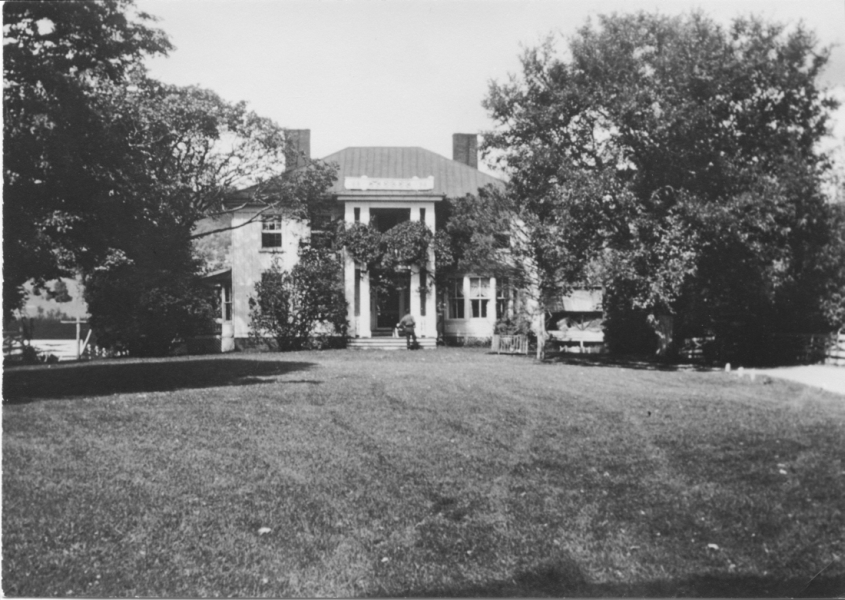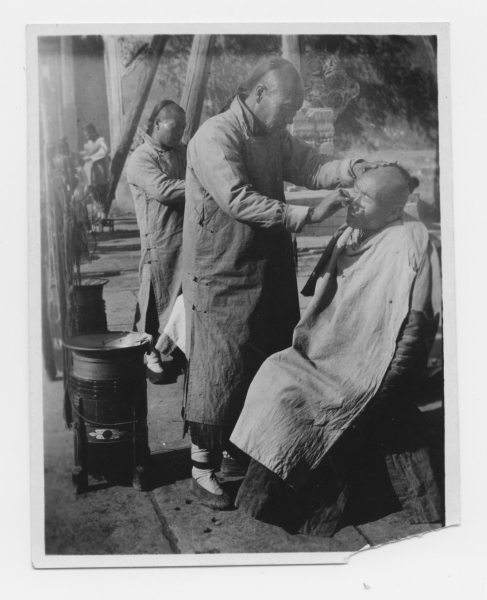Time Is Noon (49 page)
Authors: Pearl S. Buck

“Yes, get out and come in,” he said. He opened the door and helped her out. She went up the path in her dainty high-heeled shoes, clinging to his arm. Behind them Joan walked, alone. She had never in all her life clung to anyone as this woman was doing, never once.
In the house they sat down, the three of them. Instinctively she drew up for this woman the comfortable chair. “Will you sit here?” She made her voice quiet, hospitable. This was her house and these were her guests. Casually the slender figure in the girlish blue suit settled into the chintz-covered chair which was her own. She sat down on a straight chair, feeling herself huge, untidy, beside this minute perfection. Roger had loved this porcelain creature. Roger’s deep passion had been poured upon this childish woman. She glanced at him. He was sitting there, gloomy, waiting.
The little creature was looking at him with pale anxiety. “I don’t believe you feel well, Roger. He hasn’t seemed well since last night.” She was gazing at him out of her pretty, china-blue eyes. “I didn’t want him to come this morning, but he would come.” She laughed with aging coquetry. “I have to fuss over him a little. I’ve never had any children, Mrs. … Mrs. …”
She did not supply a name for herself. It did not matter what her name was.
“It is right for you to take care of him,” she said gravely. Of course Roger could never leave this little creature, this little defenseless creature. The strong, the strong must suffer. “I have my four children,” she said suddenly.
“Such a comfort, I know,” the cool high voice was murmuring.
But Roger had said nothing at all. He was sitting there in his brown tweed overcoat, silent, his hat between his fingers. It was true he did not look well. There were deep circles under his eyes and his dark skin was sullen. “Beloved!” she cried to him in her heart. As though she had spoken he lifted his head and they looked at each other fully.
“He doesn’t look well, does he?” the chattering childish voice was saying.
“Let’s go, Millie,” he said suddenly. He took her arm and went toward the door. He turned his head to say to her. “I’d like to see those four children sometime.” They were going toward the car, across the grass. “I’m coming back to see them. Careful, Millicent—your dress is caught on the door.” He disengaged her skirt carefully and helped her in.
“Good-bye,” said Joan quietly. She turned and went back into her house and shut the door. She sat down in a straight-backed chair and waited to hear the sound of the motor begin. But it did not begin.
The door opened and he was back. He had shut the door and he was at her feet, kneeling, his head on her knees. But no, she would not touch his head, his shoulders. She held herself by the arms, away from him. She was thinking over and over again, No one has ever taken care of me. I wish I were a small thing so someone would call me “little girl”—That was how silly she could be, she cried furiously in her heart, dreaming that anyone could call a great creature like her “little girl”!
“I understand,” she was saying aloud. “Of course I understand how you cannot leave a little thing like that—” She had begun so patiently and quietly, understanding. For Roger to leave Millicent would be as though she were to leave Paul. She could understand that. Then why was all this bitterness welling up in her? It lay upon her tongue, like bitter gall. “What a pity,” she was saying dryly, bitterly, “what a pity women are not all born small and pretty and weak! Women don’t need anything except little weak pretty hands and faces, little slender bodies.”
“I don’t know what you mean,” he said. He lifted up his head to stare at her.
She laughed, holding herself away from him. “I mean, go back to taking care of her!”
But he was looking at her as one of the children might have looked at her if she had turned suddenly harsh, who had never been harsh. He was frightened because she was pushing him away.
“But I came back to tell you I couldn’t bear it not to see you anymore. There isn’t any life for me away from you.”
His long body was folded absurdly at her knees. His hair was gray at the temples, as gray as her own. But she loved him. He could come here into this house as the children had come. Some day he might so come, if she did not send him away now, if step by step he came his own way.
“I need you,” he cried out at her. Then she let herself go. She released herself and took his head into her hands and pressed it against her bosom. It was right, this head against her bosom. This was right—this deep relief.
“Oh, how I’ve needed you, your strength. I’ve been so tired,” he said brokenly.
“Yes, I know—I understand … Hush—I know—”
He sighed, like a child giving itself to sleep. She looked down upon his face. He had closed his eyes. The lines were gone out of his face now, for this moment. He was at rest in her, leaning on her.
“… Roger!” Millicent’s voice came crying from the car.
He sprang to his feet at the sound. The lines sprang back again about his mouth, his eyes.
“I’ve got to go.”
“Yes, go,” she said.
“Roger, are you coming?”
He put the voice away. She could see him putting it away from between them. He took her hands.
“This isn’t the end, you know. It’s the beginning. I don’t know what the end will be. But I’ll go on until I find it. I’m coming back.” He had her hands still. She nodded, smiling. He laid her hands down gently and she let them lie in her lap as he had laid them. He was gone. She had now only the moment of his head against her bosom. She felt still the touch of his head upon her bosom, his face there, the stigmata of love. He needed her. It was enough for love’s beginning, whatever was the end.
She heard Paul whimpering, awake from sleep, and at his voice she rose and went back to him. The boys would be coming home from school, too. Yes, she could hear Frankie now, his voice calling down the road, “Singin’ wid a sword in mah hand, O Lord—singin’ wid a sword in mah han’.”
She looked out of the door as she passed. The car was gone. And down the road marched the two boys, hand in hand, to the tune of Frankie’s singing. He had taken off his shoes and stockings and was walking barefoot. The spring sunshine poured down upon them. She paused on her way to the kitchen and began to sing with them as they drew near, her voice big and fresh, “Singin’ wid a sword in mah hand, O Lord—”
After all, she need not hurry. The day was still at noon.
Pearl S. Buck (1892–1973) was a bestselling and Nobel Prize-winning author of fiction and nonfiction, celebrated by critics and readers alike for her groundbreaking depictions of rural life in China. Her renowned novel
The Good Earth
(1931) received the Pulitzer Prize and the William Dean Howells Medal. For her body of work, Buck was awarded the 1938 Nobel Prize in Literature—the first American woman to have won this honor.
Born in 1892 in Hillsboro, West Virginia, Buck spent much of the first forty years of her life in China. The daughter of Presbyterian missionaries based in Zhenjiang, she grew up speaking both English and the local Chinese dialect, and was sometimes referred to by her Chinese name, Sai Zhenzhju. Though she moved to the United States to attend Randolph-Macon Woman’s College, she returned to China afterwards to care for her ill mother. In 1917 she married her first husband, John Lossing Buck. The couple moved to a small town in Anhui Province, later relocating to Nanking, where they lived for thirteen years.
Buck began writing in the 1920s, and published her first novel,
East Wind: West Wind
in 1930. The next year she published her second book,
The Good Earth
, a multimillion-copy bestseller later made into a feature film. The book was the first of the Good Earth trilogy, followed by
Sons
(1933) and
A House Divided
(1935). These landmark works have been credited with arousing Western sympathies for China—and antagonism toward Japan—on the eve of World War II.
Buck published several other novels in the following years, including many that dealt with the Chinese Cultural Revolution and other aspects of the rapidly changing country. As an American who had been raised in China, and who had been affected by both the Boxer Rebellion and the 1927 Nanking Incident, she was welcomed as a sympathetic and knowledgeable voice of a culture that was much misunderstood in the West at the time. Her works did not treat China alone, however; she also set her stories in Korea (
Living Reed
), Burma (
The Promise
), and Japan (
The Big Wave
). Buck’s fiction explored the many differences between East and West, tradition and modernity, and frequently centered on the hardships of impoverished people during times of social upheaval.
In 1934 Buck left China for the United States in order to escape political instability and also to be near her daughter, Carol, who had been institutionalized in New Jersey with a rare and severe type of mental retardation. Buck divorced in 1935, and then married her publisher at the John Day Company, Richard Walsh. Their relationship is thought to have helped foster Buck’s volume of work, which was prodigious by any standard.
Buck also supported various humanitarian causes throughout her life. These included women’s and civil rights, as well as the treatment of the disabled. In 1950, she published a memoir,
The Child Who Never Grew
, about her life with Carol; this candid account helped break the social taboo on discussing learning disabilities. In response to the practices that rendered mixed-raced children unadoptable—in particular, orphans who had already been victimized by war—she founded Welcome House in 1949, the first international, interracial adoption agency in the United States. Pearl S. Buck International, the overseeing nonprofit organization, addresses children’s issues in Asia.
Buck died of lung cancer in Vermont in 1973. Though
The Good Earth
was a massive success in America, the Chinese government objected to Buck’s stark portrayal of the country’s rural poverty and, in 1972, banned Buck from returning to the country. Despite this, she is still greatly considered to have been “a friend of the Chinese people,” in the words of China’s first premier, Zhou Enlai. Her former house in Zhenjiang is now a museum in honor of her legacy.

Buck’s parents, Caroline Stulting and Absalom Sydenstricker, were Southern Presbyterian missionaries.

Buck was born Pearl Comfort Sydenstricker in Hillsboro, West Virginia, on June 26, 1892. This was the family’s home when she was born, though her parents returned to China with the infant Pearl three months after her birth.

Buck lived in Zhenjiang, China, until 1911. This photograph was found in her archives with the following caption typed on the reverse: “One of the favorite locations for the street barber of China is a temple court or the open space just outside the gate. Here the swinging shop strung on a shoulder pole may be set up, and business briskly carried on. A shave costs five cents, and if you wish to have your queue combed and braided you will be out at least a dime. The implements, needless to say, are primitive. No safety razor has yet become popular in China. Old horseshoes and scrap iron form one of China’s significant importations, and these are melted up and made over into scissors and razors, and similar articles. Neither is sanitation a feature of a shave in China. But then, cleanliness is not a feature of anything in the ex-Celestial Empire.”
